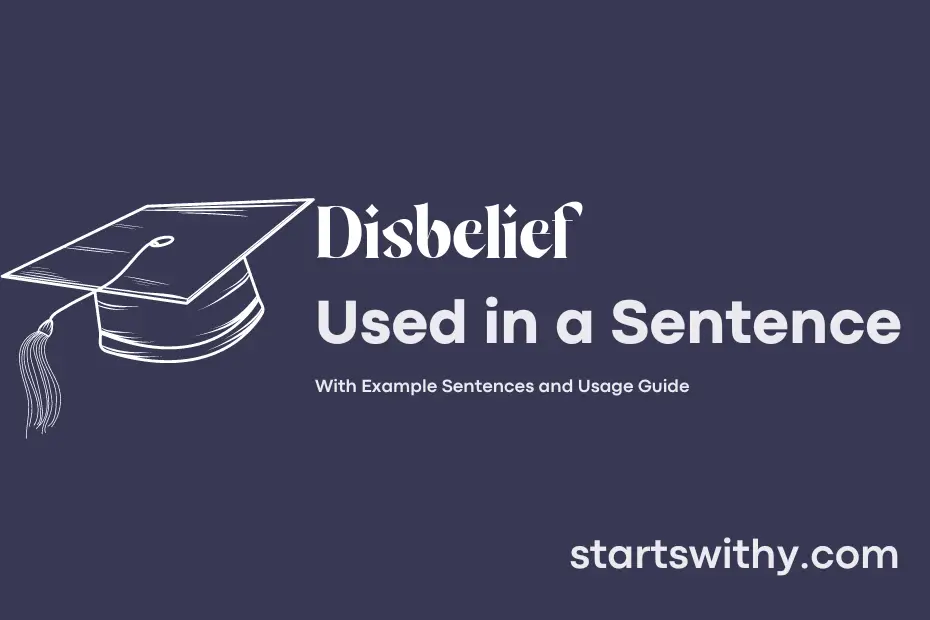Have you ever been so shocked that you couldn’t believe what you were seeing or hearing? This state of incredulity is known as disbelief. Disbelief is the inability or refusal to accept something as true or real, often due to its surprising or unbelievable nature.
When facing disbelief, individuals may experience a range of emotions such as shock, confusion, or skepticism. It can be triggered by unexpected news, extraordinary events, or unlikely outcomes, leaving individuals questioning the validity of the information presented to them.
7 Examples Of Disbelief Used In a Sentence For Kids
- I looked at the puppy with disbelief when it did a backflip!
- My teacher stared at the flying kite in disbelief.
- The magic trick made everyone gasp in disbelief.
- The clown’s colorful costume left the children in disbelief.
- I watched the juggling act with disbelief as the balls flew in the air.
- The acrobat’s somersaults caused disbelief among the audience.
- The giant ice cream sundae made me look at it in disbelief.
14 Sentences with Disbelief Examples
- DISBELIEF filled the classroom as the professor announced there would be a surprise quiz.
- She stared at her exam results in DISBELIEF as she saw a failing grade.
- There was a collective sense of DISBELIEF among students when they found out their project deadline had been moved up by two weeks.
- DISBELIEF washed over him as he realized he had forgotten to submit his assignment online.
- The students expressed their DISBELIEF when the professor announced that the final exam would cover material from the entire semester.
- She shook her head in DISBELIEF as she overheard her classmates gossiping about her.
- DISBELIEF turned to panic as the students realized they had misunderstood the due date for their group presentation.
- The student’s jaw dropped in DISBELIEF when the professor extended the deadline for their research paper.
- Murmurs of DISBELIEF spread through the lecture hall as the guest speaker shared their unique perspective on the topic.
- In an act of DISBELIEF, he logged onto the college portal to discover that his final exam schedule had been changed without notice.
- Her eyes widened in DISBELIEF as she listened to the student next to her claim that they had aced the exam without studying.
- The students erupted into laughter and DISBELIEF when the substitute professor walked in wearing a clown costume.
- He chuckled in DISBELIEF when he saw his friend’s elaborate plan to pull an all-nighter studying for their exams.
- DISBELIEF clouded his thoughts as he read the email informing him that he had been selected for a prestigious scholarship.
How To Use Disbelief in Sentences?
To use the word Disbelief in a sentence, first identify a situation where you find it challenging to accept something as true or real. For example, “I was in disbelief when I heard that she had won the lottery.”
Next, place the word Disbelief appropriately in your sentence to convey your lack of belief or skepticism towards the information or event. Remember to use correct grammar and punctuation to ensure clarity in your sentence structure.
It is important to note that Disbelief typically involves a feeling of doubt or skepticism towards something that contradicts your expectations or beliefs. You can express this feeling by using Disbelief in sentences like “She stared at him in disbelief as he confessed his love for her”, where the protagonist is finding it hard to believe the situation.
Practice incorporating the word Disbelief in various contexts to improve your understanding and usage of this term. Experiment with different sentence structures and scenarios to become more comfortable with integrating Disbelief into your everyday language.
By following these steps and practicing regularly, you will soon become adept at using the word Disbelief effectively in a sentence, allowing you to express your skepticism or incredulity in a clear and concise manner.
Conclusion
In summary, sentences expressing disbelief often convey skepticism or doubt about a particular statement or situation. These statements typically indicate a lack of belief or confidence in the truth or validity of what is being presented. For instance, “I can’t believe she said that” or “I find it hard to accept that this is happening” are common expressions of disbelief that suggest questioning or uncertainty.
When encountering sentences with disbelief, it is important to consider the context and underlying emotions behind such skepticism. These sentences may reflect a need for more information, clarification, or evidence to support the claims being made. Overall, sentences expressing disbelief serve to challenge assumptions, promote critical thinking, and encourage further exploration or discussion on the topic at hand.



